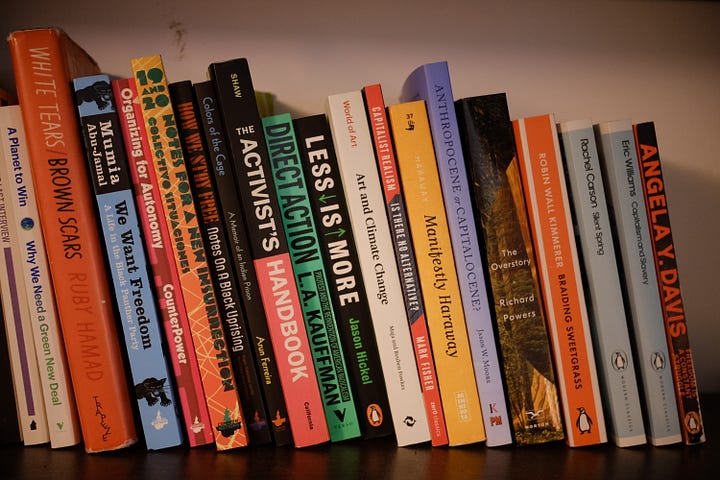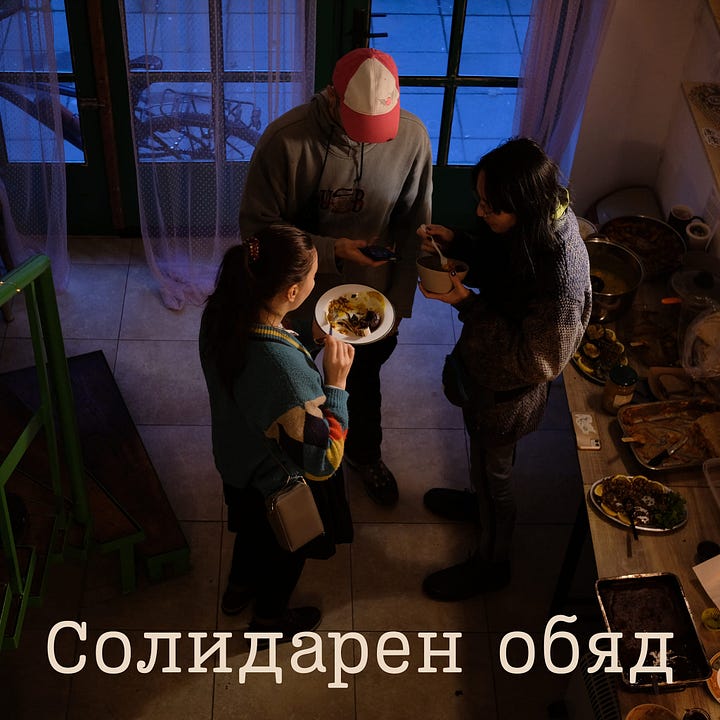“Relationships move at the speed of trust, but social change moves at the speed of relationships.” - Jennifer Bailey

The mark of a good encounter is that it changes you. It is a kind of collaborative mutual discovery. This month in Bulgaria, I encountered a group of kindred spirits who prioritized in-life conversations a priority. They’ve built Kopriva – a grassroots sanctuary fostering radical learning and mobilization, embracing individuals of diverse backgrounds and abilities, with a focus on environmentalism and feminism. Despite financial challenges and perhaps the most pernicious obstacle, the social stigma, they’ve created a community space and feminist library. In the Balkans, people believe that resilience is rooted in the wisdom of wild plants. Kopriva (the Bulgarian word for stinging nettle) is a nutritional powerhouse and potent medicine that appears in fables and myths as a symbol of fierceness and resilience.
During our conversation something in my heart shifted. We talked about the very challenging but also intimate experience of helping people settle into a shared experience, and how we shift from fight mode into a mode of invitation. Their work cross-pollinates on ecofeminism, mental health, and social movements. Its soil is the remedy to this epidemic of isolation – a community. And what I found to be the fertilizer is the role of accompaniment – a powerful element in their monthly neurodiversity meet-ups. Accompaniment means that we don’t have to understand everything about each other to be present with one another. It means to witness. Accompaniment requires us to find within ourselves the courage to lean into one another and give into our need for collective care. Kopriva is a space where we embrace, in Micky Scott BeyJones’ words, “better, bolder, and more connected lives”.
Would you like to lend a hand and support their work by donating? You can do it here.


Where are the roots of “Kopriva Space”? What inspired its creation?
Kopriva is situated in the context of a set of interrelated issues that overwhelmingly permeate daily life in Bulgaria, including poverty, homophobia, gendered violence, the rise of nationalism and racism, as well as the ever-growing destruction of the environment. The main idea behind it was to create a space where non-patriarchal, inclusive, and intersectional voices can be heard since a lot of us were part of collectives and spaces that mostly catered to neurotypical straight cis men.
We look up to nature as our primary teacher and lover, our biggest inspiration. Plants, fungi – they all teach us that in order to survive and adapt to the hostile environment that we live in, we need to maintain core values such as mutuality and interdependence. Resilience is in our nature.
Like nettles, we want to be fierce and stingy (when we have to) but also healing and nourishing. How can we deal with the toxic dynamics in our everyday life if not through fully changing ourselves and committing to liberatory practices? Mushrooms don’t just remove the toxins in the soul. They transmute toxic content into nourishment which they provide the trees with.
What is its driving force today?
“In order to undo the forces of violence shaping our everyday lives, we would have to change everything.” - Ruth Gilmore Wilson
Kopriva is a self-organised space which puts in common resources for people who need space to focus, meet, create, and recharge. It gestures towards building a community while also responding to immediate needs. For example, everyone can come to Kopriva without the need to spend money. People can use the space for their creative projects, to take a nap or cook a meal. We will soon also have a working shower that unsheltered people can use for free. The space is constantly evolving to cater to people of different social backgrounds.
Social change requires building together toward collective safety, belonging, dignity, and systems of care that support this. We are interdependent. We are in a relationship with each other. To build together the world we want, we need the space to grieve collectively, to tune in with each other, to nurture our imagination and strategise. We seek to grow liberation and justice by learning from the world around us how to best collaborate and shape change.
Kopriva is a living breathing space. Our goal is to hold space for ourselves and others in these pressing times, as well as finding collective vision of how to be and who we must become to navigate life's constantly changing conditions. We believe that strong communities will make police obsolete.
What obstacles are you encountering?
Loss, hurt, attacks, misunderstandings, burnout, money scarcity to keep the space up and running without foreign funding.
What are some of the practices that have emerged through your work — both the space itself and all the gatherings you host? I feel like they’re so instructive and nourishing to hear about.
Political consciousness is an ongoing, collective, and pedagogical process rather than a finish line. - Angela Davis
The crises are so big, urgent, and constant that there is a lot of rushing ahead of ourselves without creating a clear shared framework. We use critical, intersectional, and queer approaches to examine the uses and abuses of power. We believe it is important to observe the impact of privilege and oppression while shifting to liberatory practices.
Committing to a liberatory practice also means allowing yourself to be wrong and to unlearn and change. As we heal, how do we cultivate transformative spaces where people can learn and unlearn in safety and dignity?
Learning how to be in transformative justice practices with each other, to be abolitionist in real time requires us to examine our beliefs. What beliefs do we hold that perpetuate supremacy, inferiority, binary? What actions do we need to take to challenge these beliefs?
No space is safe and we subscribe to the idea of creating a *Brave Space. As Micky Scottbey Jones writes in his poem, we all carry pain and have caused pain. The idea behind a brave space is to start from somewhere and continue to grow whilst being supported to do so. We create this space side by side.


In these tumultuous times – of wars, environmental injustices, and endemic loneliness, there is an ever-growing need for collective care. How can we cultivate an environment where we nourish a sense of belonging, and help people settle into a shared experience?
As shapeshifters, we deal a lot with burnout and overwork, unrealistic expectations, and personal conflicts that disrupt our movements. Everything feels urgent. There is always a crisis to attend to. How can we be good to ourselves at that moment? How do we carry ourselves through each day despite the heavy grief we are carrying, despite the horrors and violence we’re witnessing and experiencing? How can we show up to the people around us and still tend to our own needs?
The main idea behind Kopriva was to create a space for collective grief, reflection, and attunement with each other so we can expand the field of possibility. We’re dedicated to using tools that help us navigate our relationships through radical, embodied practices of desire, consent, and power-sharing. When we all get better at proactively addressing our own needs, we are able to better show up for one another in meaningful ways.
Most of us are socialized to be as independent as possible, to not rely on others. At the end of the day, this is what the capitalist machine wants. However, we stand in the opposite of that - we envision a society that is more interdependent, where mutual reliance and shared vision are at the forefront. The idea of interdependence is that we can meet each other’s needs in a variety of ways but to truly lean on each other we need to embrace complexity. The strength of our movements is in the strength and depth of our relationships. This is what evolution depends on - adaptability and critical meaningful connections (on this note, check out “Emergent Strategy” by Adrienne Maree Brown).






